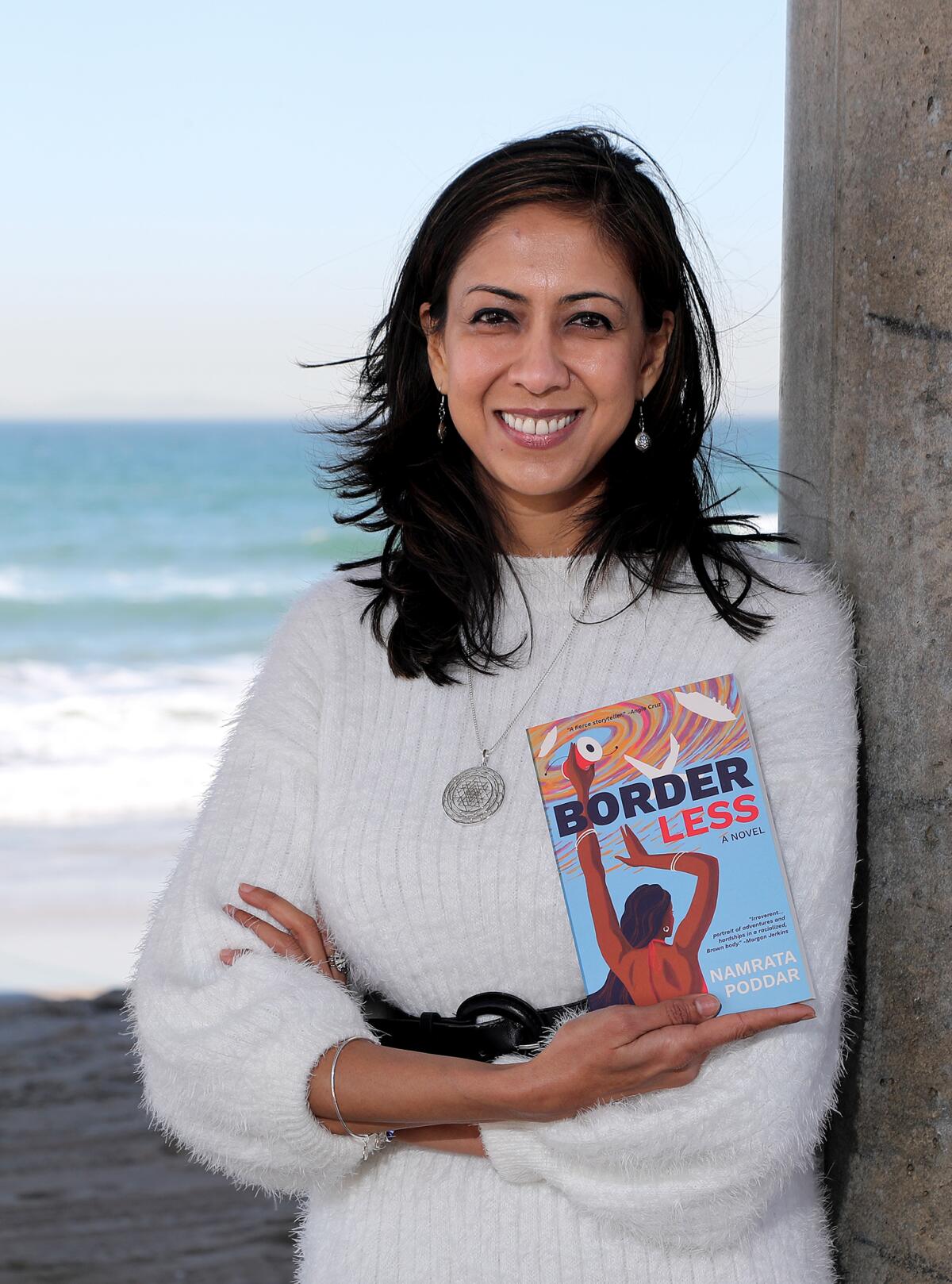Namrata Poddar’s debut novel traverses borders — and conventional storytelling

- Share via
Through the interwoven narrative of “Border Less,” Namrata Poddar’s debut novel, there arrive telling tales of desi divergence.
In one chapter, Dia, a young Indian woman, returns to Mumbai from the U.S. for a cousin’s baby shower. Before boarding her flight, a family thread on WhatsApp, an essential means of communication for much of the Global South, pings with promises to get together. But once Dia steps back into the densely populated coastal capital city, the text messages taper off into silence.
It is, as Poddar writes, the “unstated order of things.”
The baby shower at a banquet hall provides more revelations when Dia’s cousin Rani berates hotel staff for serving plates of cold food, a tirade that brings an old boss, a white American, to mind and the “punch down” pecking order office humor that differs in form but not much in substance.
“No matter how close they were growing up in India,” Poddar writes of the cousins, “what stood between them, it occurred to her, were seven years and a few oceans.”
The insights of Indian American diasporic experiences — where the borders of internalized colonialism and patriarchy are crossed and reinforced both ways — gives Poddar’s literary effort its strength, especially in its subtle Southern California settings, whether a Beverly Hills dinner date where colonial tropes about India are dished by Indian Americans themselves or a brunch between girlfriends in an Orange County café where they vent about the men in their lives in a moment of candid sisterhood.
“Southern California is one of the biggest enclaves of South Asian diasporas in the U.S.,” Poddar said in an interview with TimesOC. “Yet, when I think of South Asian American writing and the literary novel—and it just may be my ignorance—I don’t know of any set in greater Los Angeles from a 21st-century South Asian woman’s perspective.”
A local author based in Huntington Beach, the publication of “Border Less,” from an independent publisher, comes at the end of a long journey for Poddar herself. She grew up in Mumbai before earning a doctorate in French literature from the University of Pennsylvania.
During a yearlong sabbatical from the program in 2004, Poddar began jotting down story ideas in a notebook that would later populate the pages of her novel.
“I just gave myself the permission to express myself and not constantly deconstruct my own stories,” she said. “Women, like me, were told to not even dream about these things. But then, I wasn’t entirely happy with my dream gig because I always wanted to be a fiction writer.”
The notes became refined into stories, first at Bennington College’s MFA program and later at UCLA, where Poddar has lectured since 2010. Being faculty gave her discounted access to UCLA Extension writing workshops.

Along the way, Poddar moved to Huntington Beach in 2013 to live with her future husband. The couple found the coastal city more affordable than West L.A.
“When I came here, it was very disorienting,” Poddar said. “But my narrative of Huntington Beach and Orange County did shift quite a bit.”
The author sought out the county’s local arts community and diverse neighborhoods when getting settled in. The beach provided a sea breeze of familiarity.
“I’ve always lived in coastal spaces,” Poddar said. “The beach is my heart space even though I have desert roots.”
As Poddar’s notions of O.C. changed, its presence found more than a few settings in “Border Less,” from a South Asian immigrant family managing a motel near Knott’s Berry Farm to Dia, herself, appreciating the culinary diversity of downtown Huntington Beach restaurants only to receive a quick lecture on Christian monotheism by the ocean.
“The book is made of multiple stories told from different characters, almost all of whom are borderless in the sense that they do not affiliate their identity with one nation-state only,” Poddar said. “At the same time, I don’t mean ‘borderless’ as such a utopian idea. The more the borders are collapsing virtually across the world, the more borders are being enforced, as well, to keep people out.”
Though Dia is a through-line character readers can attach themselves to, from her beginnings as a call center worker to a 75-year-old settled woman, Poddar’s approach to writing “Border Less” bucks Western conventions of storytelling.
“I see it as a polyphonic, multivocal novel, even if some might say that Dia is the protagonist,” she said. “I would say a global South Asian community is the protagonist in the book.”
The novel is guided through two sections, “Roots” and “Routes,” which is a fitting display of wordplay for the intersectional, transnational feminisms explored through Dia and other characters in the book.
It’s an arc that ends in the voice of Shakti, an embodiment of divine feminine energy in Hinduism, who pens a letter to the white literary gatekeepers in the book’s final chapter.
The coda is a line drawn in the sand in the name of erasing such boundaries, another meditation on “Border Less” and its multiple meanings.
“It alludes to the literary establishment and performing a dance of destruction of older, rigid forms of the novel,” Poddar said, “and a dance of creation where our communities of colors and their forms of storytelling can be considered as legit as these dominant molds.”
Poddar will read selections from her novel at a local author’s event held at noon, March 26, at the Irvine University Park Library.
All the latest on Orange County from Orange County.
Get our free TimesOC newsletter.
You may occasionally receive promotional content from the Daily Pilot.




